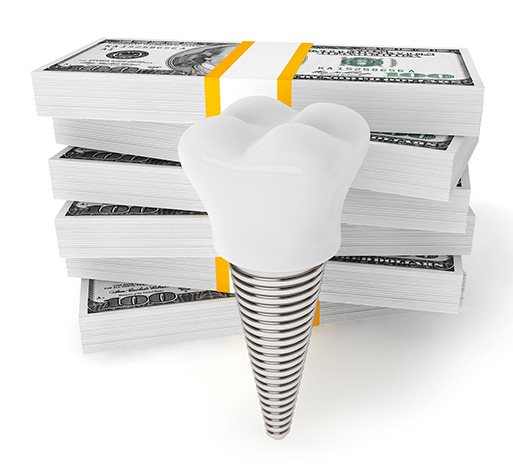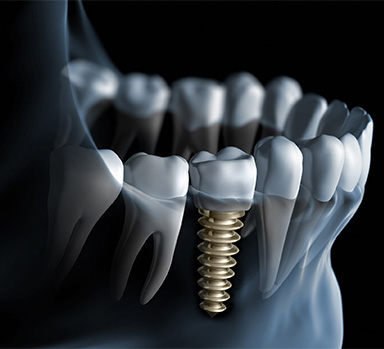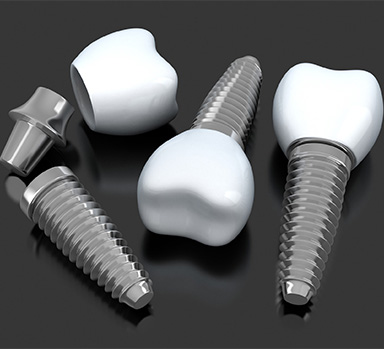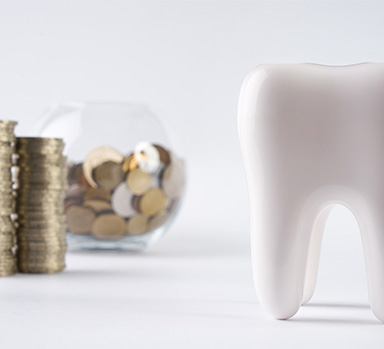Dental Implants – Itasca, IL
Missing Teeth Are No More

Permanent tooth replacement was once a dream for anyone experiencing tooth loss. The idea of enjoying life again with a stable, durable, and longer-lasting smile was unthinkable. That is until researchers discovered the benefits of titanium and its ability to fuse to the bone. With the discovery of dental implants, you can now enjoy a healthier smile for a lifetime because of their placement within the jawbone and their ability to withstand daily wear and tear. Call our dental office to find out what you need to do to learn if you’re a candidate for dental implants from our Itasca, IL dentist.
Why Choose Hamilton Lakes Dentistry for Dental Implants?
- Personalized Treatment Plan Designed For Each Patient
- Partners with Local Dental Implant Specialists
- Sedation Dentistry Available
What are Dental Implants?
Dental implants are the closest thing to natural teeth because of how they mimic the natural tooth structure. With a titanium post that looks like a tooth root, it is placed into the jawbone and fuses over several months. It is then topped with a customized dental crown, bridge, or denture depending on how many you are missing. With dental implants, you can expect to enjoy a better quality of life because of how you can easily eat your favorite foods, smile with greater confidence, and speak with optimal clarity.
The 4-Step Dental Implant Process

Overall, dental implant treatment can be one of the most complex and advanced in dentistry. However, it can be broken into four general steps: consultation, surgery, osseointegration and abutment, and restoration. Before treatment starts, we’ll make sure you understand these steps and what’s coming next so you know what to expect. If you have questions at any point during these stages, we can answer them for you happily, so don’t hesitate to reach out to us.
Initial Dental Implant Consultation

You will first meet with your implant dentist to discuss your candidacy for treatment. It is during this visit that you will learn if there are any issues standing between you and your fully restored smile. If you require any preliminary treatments such as bone grafting, periodontal therapy, or tooth extraction before receiving your dental implants, we will help you through the process. Getting necessary prework done beforehand can help ensure the long-term success of your implants.
Dental Implant Surgery

Once you are cleared for surgery, we will refer you to a local dental implant specialist who will perform the minor oral procedure. The specialist may wish to meet with you to answer your questions about the surgery. For the procedure itself, after local anesthesia, small incisions are made in the gums where the dental implants will be put into place. The posts are then inserted into the jawbone.
Dental Implant Osseointegration & Abutment

After the gum tissue is closed and the procedure is complete, you will return home to heal. The gum tissue should heal within a week of the procedure, but the more important process takes longer. For 3-6 months, osseointegration must occur, which involves the fusing of dental implants and bone. After you’ve fully healed, you’ll return to our office to have small abutments attached to the tops of your implants. Abutments are basically the connection piece between the post and your restoration.
Delivery of Dental Implant Restoration(s)

The final step in the dental implant process is to receive your customized restoration. This can include a crown, bridge, or denture. First, we’ll take impressions of your upper and lower arches and send this information to our trusted dental lab. Over the course of a few weeks, they will produce your custom restoration(s). We’ll call you when it’s ready, and you’ll come in to have it bonded in place.
Benefits of Dental Implants

All in all, dental implants are popular with dental patients. Dentists will even place 500,000 of these posts per year! Often, this goodwill stems from the treatment’s placement method. How implants work involves perks that other tooth replacements can’t mimic. As a result, many view the posts as the ultimate tooth replacements. Our office can highlight the benefits of dental implants if you’d like. To that end, just keep reading or call us for the details.
Day-to-Day Benefits

As you’d expect, implants’ day-to-day benefits stand out the most. These include:
- A Stunning Smile – Since dental crowns top them, implants blend seamlessly with adjacent teeth. They match your other chompers’ color, size, and shape enough that people won’t even notice they’re artificial.
- A Confident Attitude – Once they’ve restored your smile, implants will naturally boost your confidence. You’ll feel more assured in your looks as you mingle with friends and family.
- Easier Eating – Implants restore your bite force when they fuse with your jaw. From there, you can chew and eat your favorite tough foods again.
- Low-Effort Care – Compared to dentures or bridges, implants are easy to clean. You can just care for them as you would any other teeth. As such, brush them twice daily, floss between them once daily, and rinse with mouthwash.
Health Benefits

Besides their day-to-day benefits, implants also have health-related ones. That means using them will improve your body. For example, implants usually lead to:
- A Cleaner Mouth – If you leave smile gaps untended, they’ll allow harmful bacteria to breed. These microbes could then cause tooth decay, gum disease, etc. Still, implants would fill the gaps and thus improve your oral health.
- A Nutritious Diet – Implants let you eat tougher foods, so they expand your dietary options. This wider range of meal choices leads to better nutritional health.
- A Stronger Jaw – Without fast treatment, tooth loss will erode your jaw. This erosion will then trigger a facial collapse. However, dental implants can prevent and reverse this process. They stimulate your jawbone’s tissues, ensuring your jaw stays full and robust.
- High Tooth Support – If you lack a full grin, your smile gaps will make the remaining teeth tilt and fall out. Luckily, implants excel at filling these spaces. The posts will thus keep your other teeth straight and stable.
Long-term Benefits

As it turns out, implants offer some great long-term advantages. The most common of these are:
- High Success – In the long run, dental implants nearly always succeed. Their ten-year success rate even exceeds 95%!
- Enduring Effects – The average dental implant lasts roughly 15-20 years. Meanwhile, a well-maintained one can reach a lifespan of over 30 years. So, there’s a good chance your implant treatment will last a lifetime.
- Financial Savings – Over time, implants can actually save you money. Their long lives (see above) mean they need few (if any) repairs or replacements. In contrast, a denture or bridge requires plenty of pricey follow-up care. (Either of these options will only last 5-7 years.)
Who Dental Implants Can Help

Most adults who are missing one or more teeth can be candidates for dental implants. However, you may lack immediate clearance for treatment if you suffer from tooth decay, gum disease, or an oral infection. Fortunately, there are accessible solutions available that can improve the state of your smile and better prepare you for the dental implant process. Because of their unique versatility, you and your dentist will discuss the type of restoration you need to enjoy a healthy, complete smile again.
Missing One Tooth

If you’re only missing one tooth, we will recommend that a dental crown be made to sit on top of the single dental implant post and abutment. This will fill in the gap and make it easier to smile, eat, and speak.
Missing Multiple Teeth

When missing two or more consecutive teeth, we can use two dental implant posts and a custom bridge to complete your smile. However, if your teeth are not missing consecutively but instead are scattered throughout an arch, we can have an implant partial made that affixes to titanium posts instead of relying on metal clips that attach to your teeth.
Missing All of Your Teeth

A traditional denture no longer has to be the only option for an arch of missing teeth but instead, you can opt for an implant denture. Consisting of between four and six dental implant posts, they are positioned within the jawbone and serve as a foundation for a customized denture to be secured on top.
Learn More About Implant Dentures Learn More About All-On-4 Dental Implants
Understanding the Cost of Dental Implants

One of the things that makes dental implants so powerful is the fact that they can be customized to meet your needs. However, this also means that it can be a little bit difficult to pin down exactly what your dental implants will cost you without meeting you first.
That said, we will make every effort to help your treatment fit your budget. Until we can meet you in person, here’s what you should know about the cost of dental implants.
Preliminary Treatments & Dental Implant Surgery

First of all, it’s common for people to need to have some preliminary work done before their dental implant surgery. For example, it’s common for people who have been without teeth for a long time to have their jaw’s strength degrade, which causes problems when it comes time to place dental implants. You may therefore need a bone graft or sinus lift in order to develop a strong foundation for your dental implants, which you should factor into the overall cost of your services.
Then there’s the cost of the dental implant surgery itself. We partner with excellent local specialists to place our dental implants, so you’ll have to talk to them about the cost of their services before you start.
The Parts of Your Dental Implant

Then there’s the cost of the dental implants themselves. This has to do with a few factors, namely:
- The number of dental implants you’ll need to replace your teeth
- The size of your dental implants
- The material the dental implant is made from
- The type of restoration you’re using for your dental implant. In general, restorations replacing more teeth are more expensive, with implant dentures costing more than an implant crown.
- The brand of dental implant you’re using
We’ll talk you through each of these options when we meet you in person, allowing you to make an informed decision about each of them.
How Dental Implants Pay for Themselves

As you may know, dental implants tend to be a bit more involved than dentures or dental bridges, and are therefore often more expensive. However, the fact is that you’re getting a lot for your money; not only are dental implants incredibly strong and realistic, they also routinely outlast other methods of tooth replacement by a factor of two to one. That being the case, the money you spend on dental implants will save you from having to replace your restoration down the line.
Does My Dental Insurance Cover Dental Implants?

For a long time, dental insurance didn’t cover dental implants. However, as the treatment has gained popularity, this has changed. We’ll help you file claims to your insurance company, and will take the time to make sure that you’re getting the most out of your benefits.
Making Dental Implants Affordable

If your insurance company doesn’t cover dental implants, you may need to take an alternative approach to making the care you receive affordable. One option you may want to consider is financing, which can front the cost of your dental care and allow you to pay off the balance later. We frequently work with CareCredit, which offers many low-to-no interest financing services to qualify.
If you have questions about this or any other method of making care affordable, give us a call and we’ll be happy to bring you in for a consultation.
Maintaining & Caring for Your Dental Implants

Maintaining and caring for your dental implants is key. If you don’t, then your risk of dental implant failure increases significantly. So, if you haven’t already, make sure that you:
Make Oral Hygiene a Priority

No matter how busy you are, you need to make oral hygiene a priority. That means brushing your teeth for a full two minutes each morning and flossing your teeth every night before bed, even if you’re tired. Outside of that, do your best to rinse with mouthwash consistently, replace your toothbrush before the bristles are frayed and smelly, and remember to clean your toothbrush holder every so often.
Eat a Healthy Diet

While some foods benefit your oral health, others do not. So, to maintain your teeth, your gums, and your dental implants, you need to fill your plate with lean protein, fresh fruits, and seasonal vegetables. Simultaneously, you should limit your intake of sugary and starchy snacks, like ice cream, potato chips, hard pretzels, and lollipops.
Break Bad Habits

Although dental implants are crafted from only the best materials, and they are extremely durable, you still need to do your part to prevent wear. That means not using tobacco products, drinking alcohol excessively, biting your nails, or chewing on ice cubes. You also shouldn’t use your teeth in place of scissors to remove plastic wrapping. Basically, avoid doing anything that could cause yours to chip, crack, or come loose.
Protect Your Dental Implants

Protecting your dental implants from unforeseen force and impact is also a priority. In other words, if you participate in a sport (even a non-contact one), you should wear a mouthguard. If you grind/clench your teeth at night, you should wear a nightguard. If you don’t have one, that’s okay – our team at Hamilton Lakes Dentistry can make one for you! We will also give you helpful tips on how to keep it in pristine condition so it lasts for several years.
Schedule Regular Dental Checkups

Our Itasca dental team isn’t just here to restore your smile; we’re here to help you maintain it as well! That’s why we recommend coming to our office every six months for a dental checkup and cleaning. It’s also of the utmost importance that you contact us sooner if you notice that something is wrong, like there is a pimple-like bump on your gums or your dental implant feels loose. That way, we can intervene right away, reducing the chances of dental implant failure in the process.
Dental Implant FAQs
Does Getting Dental Implants Hurt?
For most patients with dental anxiety, it stems from the fear of pain during dental procedures. At Hamilton Lakes Dentistry, we use the most modern versions of local anesthetics available to ensure that your dental implant surgery is as comfortable as possible. Most patients who have undergone the procedure say that there is more of a feeling of pressure or abrasiveness than pain. Most likely, you’ll feel the most discomfort after the procedure while your implant sites are healing. However, this can be managed with over-the-counter pain medications like ibuprofen or acetaminophen. You can also use an ice compress in intervals of 10–20 minutes on and 30 minutes off.
Am I Too Old to Get Dental Implants?
You’re never too old for dental implants! When you come in for your consultation, your dentist will evaluate your mouth using several diagnostic tests. Once these have concluded, they’ll have a better idea of your candidacy for implants. While age is a factor due to the prevalence of physical and oral health issues that seniors are more likely to have, the ultimate decision will be made based on other factors. For example, does your jawbone have enough bone density to support the implant? Do you have healthy gum tissue? The answers to these questions are more critical than your physical age.
How Successful Are Dental Implants?
Dental implants have one of the highest success rates of any dental procedure, at 95 percent! This is in part because the technology and techniques used in modern implants are getting better and more precise; however, the real secret to dental implant success is in the preparation. Before your implants are placed, your dentist will give you a full examination, including X-rays, a discussion of your lifestyle habits, and your medical history. By ensuring that there are no obstacles in the way of your treatment, your dentist can place your implants with confidence.
How Long Do Dental Implants Last?
It's true that dental implants are a big investment of time and money, so it’s only natural that you wonder how long they’ll last. The good news is that these highly successful fixtures can last for decades, or even a lifetime. However, their longevity largely depends on how well you take care of your oral and physical health. For example, if you practice good oral hygiene by brushing and flossing every day, you will be less likely to contract gum disease, which can weaken your jawbone and cause your implants to fail. Lifestyle factors like smoking and drinking excessive amounts of alcohol can also negatively impact their longevity.
